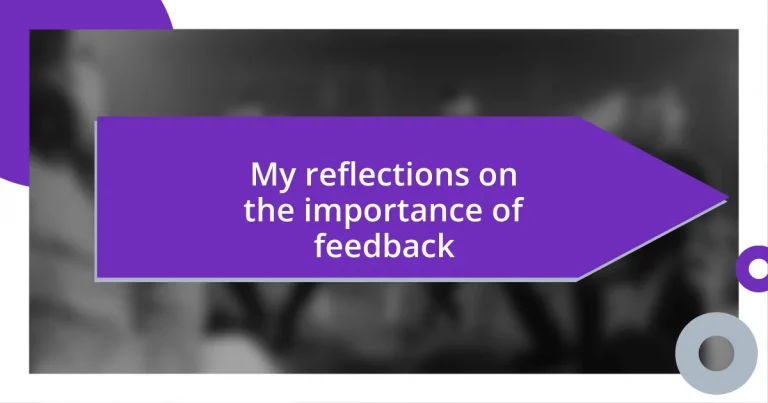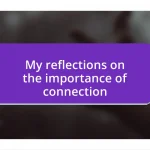Key takeaways:
- Feedback serves as a vital tool for personal and professional growth, transforming how we perceive our strengths and areas for improvement.
- Effective feedback requires specificity, balance between constructive criticism and positive reinforcement, and timely delivery to facilitate real-time learning and adaptation.
- Continuous feedback fosters a culture of growth, enhancing relationships and encouraging proactive exchanges that can lead to unexpected insights and improvements.
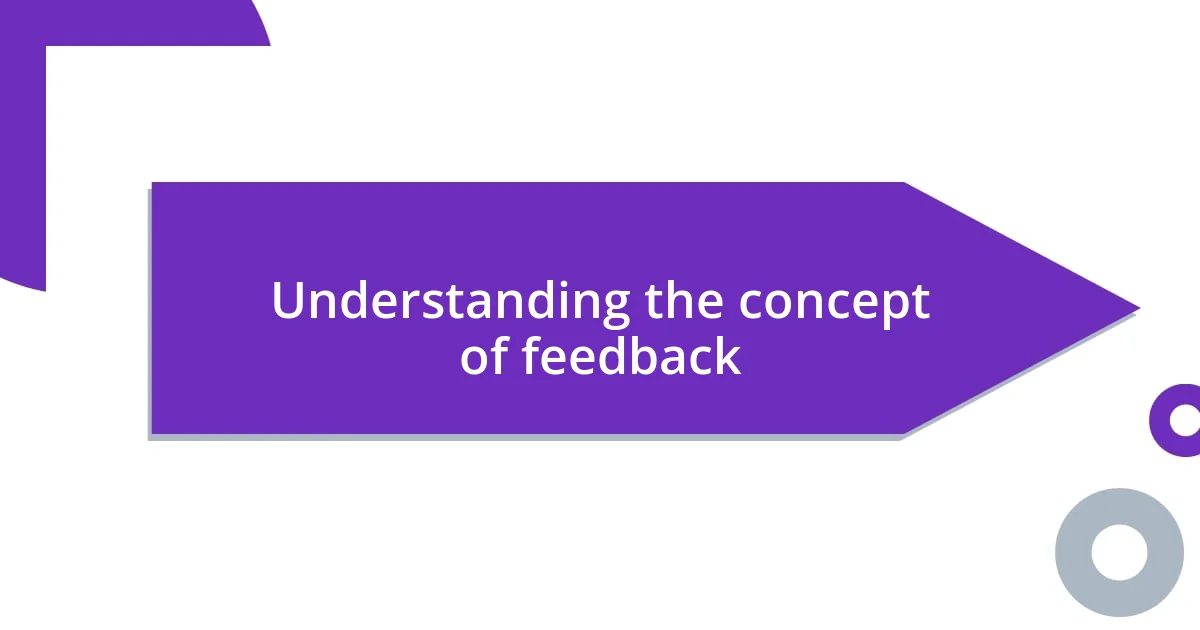
Understanding the concept of feedback
Feedback is essentially the information we receive about our performance or behavior, and it can play a transformative role in our personal and professional growth. I still recall a moment early in my career when a mentor told me, “Without feedback, you’re sailing blind.” That statement resonated deeply with me, igniting my understanding of how crucial it is to view feedback as a tool for clarity rather than criticism.
When I think about feedback, it’s clear that it can take many forms—praise, constructive criticism, or even silence. I remember a project where my team thought we had nailed it, only to learn later that our audience perceived it differently. That eye-opening experience taught me that feedback isn’t just about what’s said; it’s also about how it’s received and the emotions it stirs. Have you ever had a similar realization where feedback changed your perspective?
Moreover, feedback is not a one-way street; it’s a dialogue that enriches relationships. I once asked a colleague for feedback on my presentation skills, and it turned into a conversation that deepened our working relationship. We often overlook how sharing feedback can foster trust and understanding, but it’s during these exchanges that the real magic happens, isn’t it?
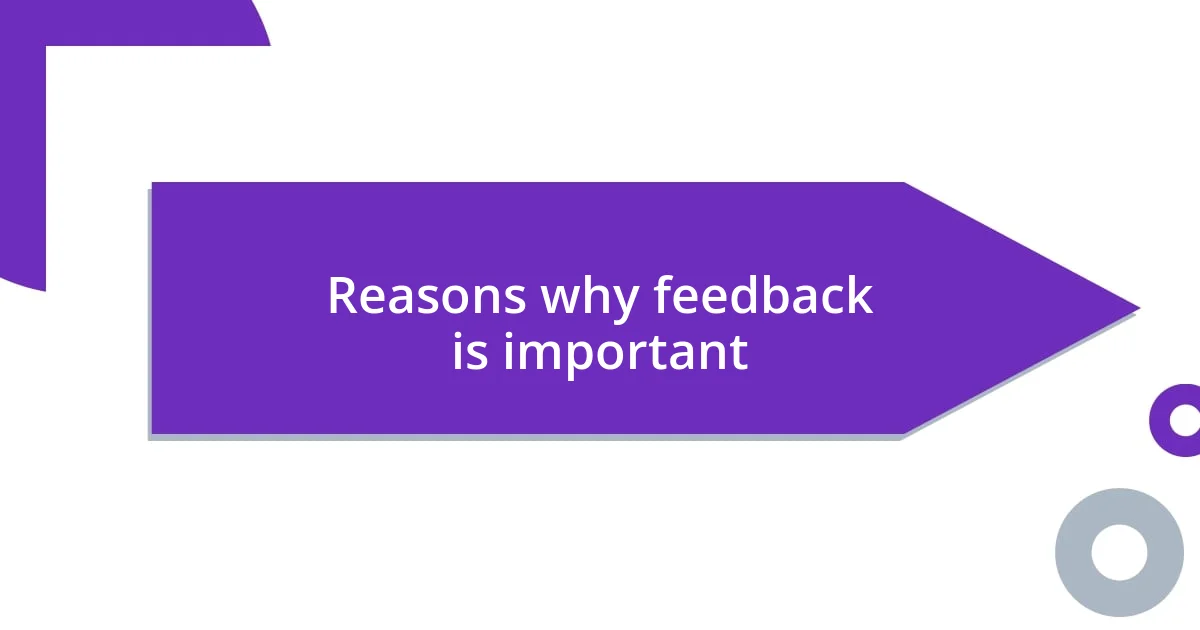
Reasons why feedback is important
Feedback is essential for growth and improvement. It acts as a mirror, reflecting our strengths and areas needing enhancement. I’ve been in situations where I received feedback that felt uncomfortable, but upon reflection, I recognized it as a steppingstone toward my development. Embracing that discomfort can lead to breakthroughs in our work and relationships.
Here are a few reasons why feedback holds such significance:
- Clarity: It helps clarify expectations and performance standards.
- Motivation: Positive feedback can boost morale and encourage continued effort.
- Accountability: It fosters a sense of responsibility for our actions.
- Learning: Feedback provides learning opportunities to refine our skills and knowledge.
- Adaptation: It helps us adjust our approach based on the needs and preferences of others.
I remember a time when I was wrapped up in a project and thought everything was going well. A colleague offered some constructive criticism that initially caught me off guard. However, it allowed me to pivot and enhance the final outcome significantly. From that moment, I learned the value of being open to different perspectives and how they can lead to better results.
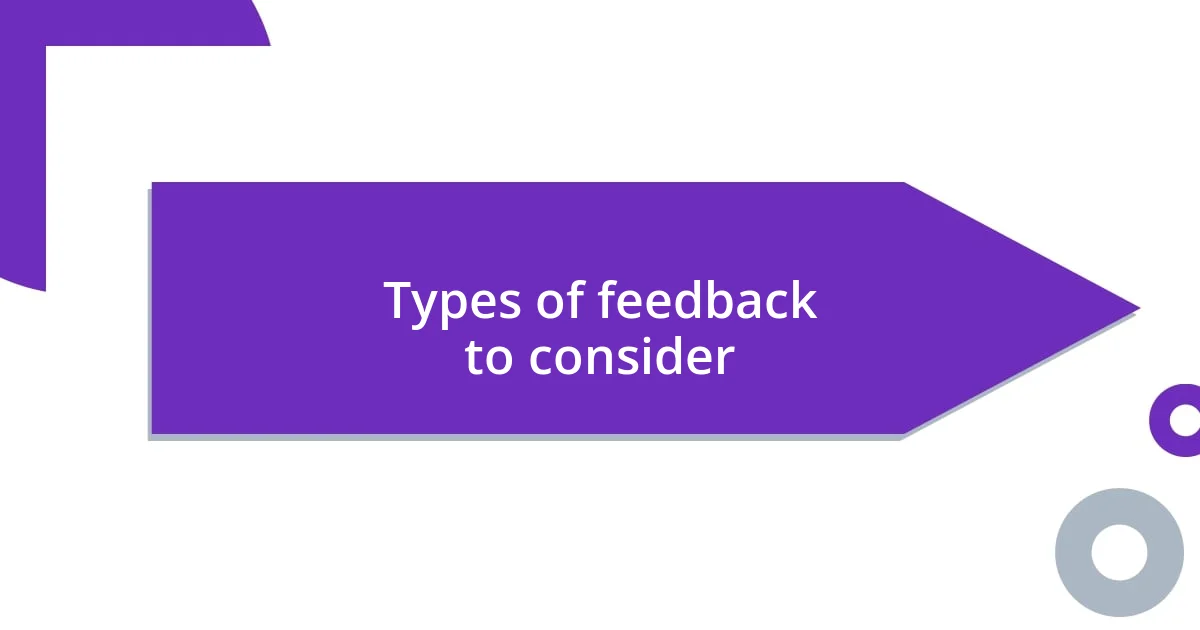
Types of feedback to consider
When it comes to feedback, I think it’s incredibly important to recognize the different types available. Descriptive feedback, for example, gives specific details about what went well or what could improve. I remember once receiving a piece of descriptive feedback that highlighted my strong storytelling in a report but suggested I incorporate data more effectively. That clarity was a game-changer for me.
On the other hand, evaluative feedback, which often rates or judges performance, can sometimes feel daunting. I recall presenting at a conference and receiving some evaluative feedback that wasn’t easy to swallow. However, that feedback motivated me to refine my skills and come back stronger next time. The contrast between descriptive and evaluative feedback is significant, as one can feel empowering while the other may sometimes dampen one’s spirit.
Lastly, peer feedback offers a unique perspective that can drive improvement. I remember setting up a feedback session with my coworkers for a project we worked on together. Their insights were invaluable and often more relatable, as they understood the challenges firsthand. Engaging in this collaborative type of feedback helped us connect more deeply as a team. It reinforced the idea that feedback, no matter the type, is essential for growth.
| Type of Feedback | Description |
|---|---|
| Descriptive | Specific insights that clarify strengths and areas for growth. |
| Evaluative | Judgmental feedback that provides ratings or assessments of performance. |
| Peer | Feedback from colleagues, offering relatable insights and fostering teamwork. |
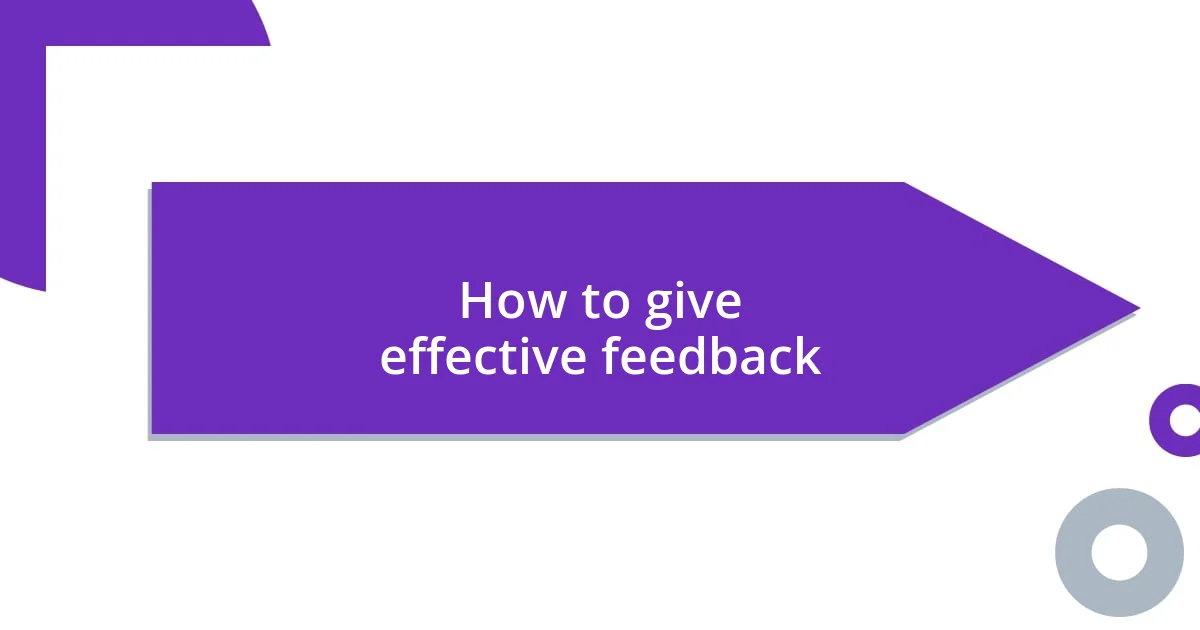
How to give effective feedback
When giving effective feedback, the key is to be specific and constructive. I recall a moment early in my career when a supervisor told me my presentation needed improvement but didn’t elaborate on what I could change. That kind of vague feedback left me feeling lost. It was a lesson I took to heart; now, when I provide feedback, I strive to highlight exact points that can help the person grow.
Another vital element is balancing constructive criticism with positive reinforcement. I remember a teammate who once shared great insights in a brainstorming session but struggled to voice his ideas confidently. I made it a point to commend his contributions while gently suggesting ways he could deliver them more assertively. It’s fascinating how a little encouragement can energize someone and help them discover their potential. Isn’t it rewarding to witness growth that stems from our support?
Finally, timing is everything. I learned this during a challenging project where feedback was given too late, affecting our team’s ability to adapt. Timely feedback allows for real-time adjustments and keeps the momentum going. I’ve made it a principle to share my observations as soon as possible, creating a culture of openness where everyone feels comfortable engaging in dialogue. After all, don’t we all appreciate guidance in the moment rather than in hindsight?
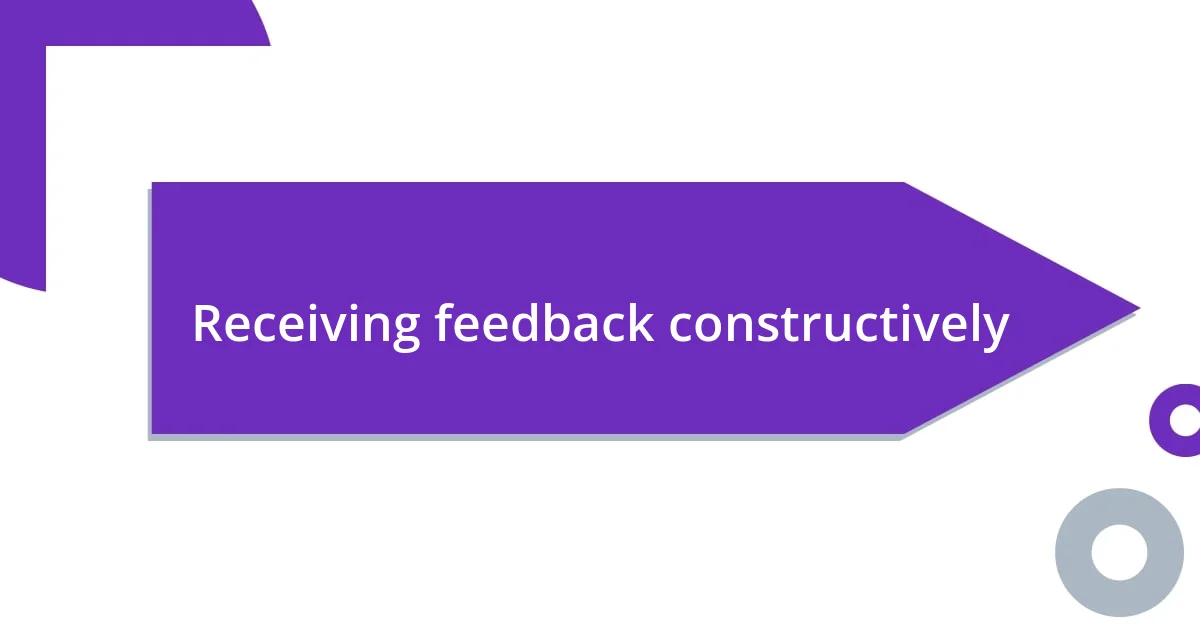
Receiving feedback constructively
Receiving feedback constructively can often feel like walking a tightrope between vulnerability and strength. I remember the first time I received critical feedback on a writing project. Initially, it stung a bit, but as I processed the comments, I realized they were designed to help me grow. That moment taught me the value of detaching my self-worth from my work, which transformed my approach to receiving feedback.
There are also days when feedback seems particularly challenging to accept. I once had a mentor who pointed out some major gaps in my project management skills. Instead of feeling defeated, I approached him afterward, curious about how I could improve. His willingness to help me chart a path forward turned my anxiety into actionable steps. Have you ever found that asking for clarity can radically shift how you perceive feedback?
Lastly, I’ve found that embracing a mindset of continuous learning has made receiving feedback feel less like an annual performance review and more like an ongoing conversation. I recall attending a workshop where the facilitator encouraged us to view feedback as a gift. That perspective was liberating! It dawned on me that every piece of feedback is an opportunity to refine our craft. Isn’t it empowering to think that every comment can lead us one step closer to our best selves?
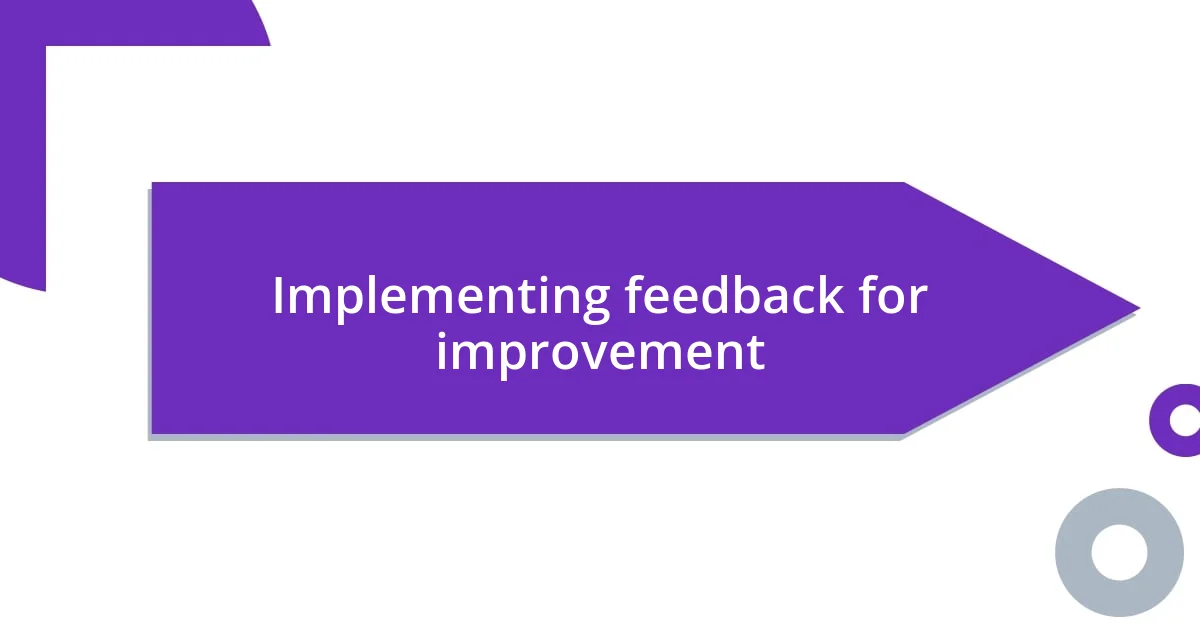
Implementing feedback for improvement
Implementing feedback for improvement is something I consider vital in my growth journey. I remember a project where a colleague suggested refining my approach to client communications. Initially, I felt defensive, but after reflecting, I realized his insights could enhance my effectiveness. Isn’t it funny how feedback can sometimes feel like a mirror reflecting parts of ourselves we might not see?
As I began to incorporate his suggestions, I noticed a significant change. Clients responded better, and my confidence grew. It was like unlocking a level in a game I didn’t know existed! If I hadn’t acted on that feedback, I would have missed out on a chance for improvement. Have you experienced a moment where embracing feedback led you to unforeseen success?
Moreover, I’ve found that creating a structured plan for implementing feedback helps in making it actionable. After an intense review session on my last project, I drafted a list of specific changes I wanted to try. Breaking it down into smaller, manageable tasks made them feel less daunting. It’s remarkable how a little organization can make the process smoother. Wouldn’t you agree that having a clear path forward makes those initial sting of criticism feel more like a stepping stone rather than a stumbling block?
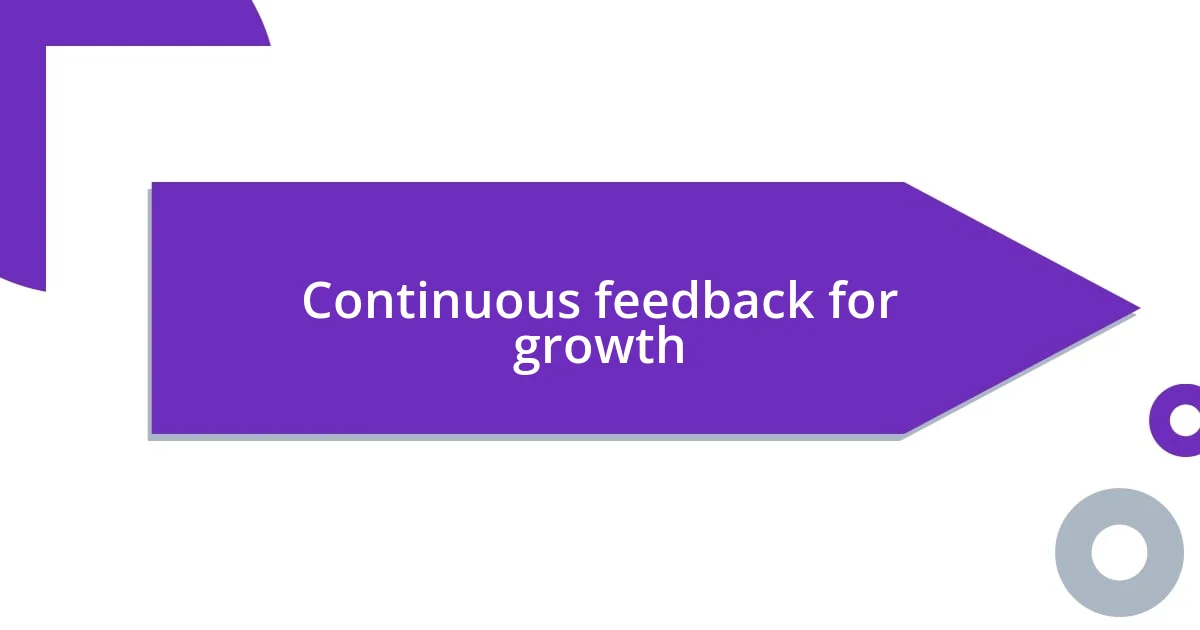
Continuous feedback for growth
Continuous feedback is essential for personal and professional growth, and I truly believe that fostering a culture of ongoing dialogue can yield incredible results. I recall a time when I worked with a creative team where we made it a point to share feedback at every stage of a project. This constant exchange not only improved our work but also deepened our relationships. Isn’t it amazing how open conversations can create a safe space for innovation?
Through this process, I learned that feedback isn’t just about pointing out flaws; it’s also about recognizing strengths. In one instance, a teammate highlighted my strengths in conceptualizing ideas while also suggesting clearer communication. Instead of choosing to feel ambivalent, I felt invigorated, realizing that their insights could sharpen both my skills and our collective vision. Don’t you think that recognizing what we do well can motivate us to tackle areas needing improvement effectively?
Moreover, I’ve discovered that seeking feedback proactively can lead to new dimensions of growth. After every presentation, I’ve started asking specific questions, like “What resonated with you?” or “What could I have done better?” The responses I receive often spark ideas I hadn’t considered before. It’s fascinating to reflect on how initiating feedback can transform my perspective and fuel my progress. Have you ever noticed a shift in your thinking after someone said something unexpected?












